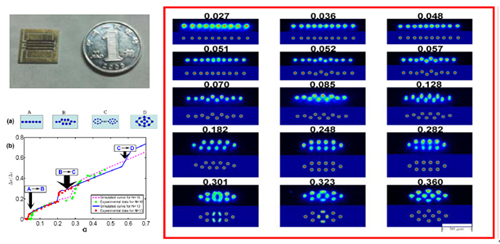The research group for Bound-System Quantum Information Processing at Wuhan Institute of Physics and Mathematics (WIPM), Chinese Academy of Sciences, has just published their latest research result in Scientific Reports exploring structural phase transitions by ion crystals.
Phase transitions result from competition between order and disorder, and in modern physics phase transitions in many-body systems have been the research focus. Corresponding to solid, liquid and gas, matter behaves as phases of solid, liquid and gas, whose interchanges depend on temperature variation. Phase transitions occur at certain temperatures with sudden changes of the phases. The cold ions confined in an electromagnetic trap can demonstrate phase transitions of various structures under the action of both the coulomb repulsion and the confining potential, which is an ideal platform for investigating complexity in many-body physics and phase transitions in quantum regime. As a result, the study of structural phase transitions by ion crystals can not only discover rich many-body properties but also provide effective mechanism for controlling qubits in quantum information processing.
The experimental setup is a home-made surface-electrode trap (also called ion chip), which owns five electrode pairs with the whole size smaller than an one-dime coin and can form three potential wells under the electric control. The ion chip, which can control the ions moving back and forth and rotating, is a preliminary quantum computer for purpose of scalability. Focusing on the structural variation of 6-16 ions at temperature of 50 mK, the authors found four phases and three phase transitions, where two of the phase transitions as below have never been discovered previously: Changes from zigzag to ellipse and from ellipse to concentric ellipse. Numerical simulation under the consideration of ion heating confirmed that they are second-order phase transitions.
The research is supported by National Fundamental Science Research Program “Engineering quantum states in coupled systems of trapped single-atoms (ions) and light” and National Natural Science Foundation of China.
(http://www.nature.com/search?q=srep21547 )

Fig. 1 (Top left-hand panel) Comparison of the ion chip with an one-dime coin; (Bottom left-hand panel) Four phases: A, B, C, D, and three phase transitions: A->B, B->C, C->D; (Right-hand panel) Experimental observation of the structural phase transitions with 10 ions, where the numbers are for the anisotropic parameter.